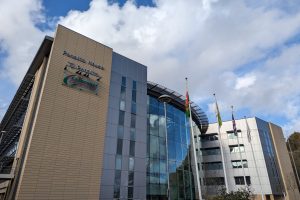RACHAEL MACKAY, Year 6 teacher and STEM lead, has been using the British Science Association’s (BSA) CREST Awards scheme to help embed the four purposes of the new Curriculum for Wales with her pupils
Following the introduction of the new curriculum in all Welsh primary schools in September 2022, Monnow Primary School/Ysgol Gynradd Monnow (Newport) teacher Rachael Mackay has been using project-based learning to encourage pupils to behave like real-life scientists and engineers. This style of learning is also very effective for meeting the curriculum’s four purposes.
The new curriculum aims to support pupils to become ambitious, capable learners; enterprising, creative contributors; ethical and informed citizens; and healthy, confident individuals. Using a range of activities and resources from the BSA CREST Awards scheme, Rachael has helped her pupils develop these essential characteristics, while exploring the world of science and engineering in a fun, engaging and creative way and providing excellent opportunities for cross-curricular learning.
CREST Awards is a nationally recognised scheme for student-led project work, designed to challenge inquisitive students and help them run investigations by behaving like scientists, and connecting STEM subjects to their everyday lives.
CREST Awards are free for all primary and secondary schools in Wales thanks to funding from the Welsh Government Office for Science.
The largest project the Monnow students have participated in has been the ‘Machines of the Future’ Discovery Challenge which encouraged them to think about how machine learning and artificial intelligence (AI) relates to their lives and how it could best be used in the future.
The pupils took part in various activities throughout the day, including discussions of what tasks they would entrust a machine with, exercises that explored the role machine learning plays in their everyday lives (from suggesting preferred programmes on streaming platforms to building things in factories) and experiments in which they tested a variety of different AI powered tools.
This Discovery Challenge saw the children created their own prototype robots from recycled materials, before producing a LEGO version which could be controlled with code built by the students, as well as building their very own chatbot to instruct the machine and a feedback system via a programme called Scratch. The children then rounded out the project by creating a website through which to advertise the machine, allowing them to develop additional digital and creative skills whilst challenging their entrepreneurial spirits.
Reflecting on how the project allowed her to integrate the curriculum’s purposes into her pupil’s learning, Rachael Mackay said:
“Throughout the day, the project hit so many of the four purposes. The children had to be ambitious and capable to work in teams to complete the exercises, often taking on specific roles and responsibilities. When asked to come up with ideas for a machine which hadn’t been created yet, they demonstrated their entrepreneurship and creativity, even physically creating the machine!”
“During the project, the students had to act as ethically informed citizens, as they were required to determine how their prototypes could be made using only recycled or reused items, and consider whether their machine would take employment away from an individual or group of people.”
Another project saw the pupils get to know their community a bit better and celebrate their shared history and culture through a Wild Creations Discovery challenge. Inspired by their own surroundings, pupils used computer programmes, design software and physical materials to design unique art installations which celebrate their local culture. The project also supported learning across other subjects including geography as the children became more familiar with their local area and landscape, as well as drawing in elements of expressive arts and IT learning through the creation of 2D and 3D designs.
The project also directly linked with several of the new Welsh curriculum’s purposes. The project’s focus on community supported the children to be ethically informed citizens. The sense of belonging the children gained throughout the project additionally contributed to the healthy and confident purpose within the new curriculum, in which children begin to have a better sense of their community and support networks which in turn positively impacts mental health.
Rachael Mackay remarked that the most noticeable impact of the CREST projects has been the boost to the pupils’ communication skills and confidence, which ties in closely with them being healthy and confident individuals. She said:
“The children became so accustomed to communicating with each other to problem solve and create both within their teams and in a specific role, that their confidence in presenting to others increased dramatically, even after the project had ended.
“Every child participated, even children who were historically fearful or reluctant to contribute to class discussions. This pattern continued a month later when children had to once again present in teams for a completely different project. That confidence and ability to communicate all started with the CREST Award.”
The Wild Creations resources are also available in Welsh language.
For more information about the CREST awards, please visit: crestawards.org

















